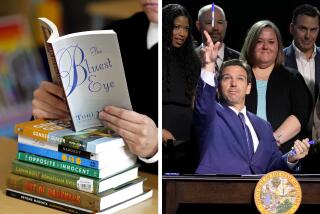Kinko’s Settles Copyright Suit Brought by Publishers : Courts: The photocopy shop operator will pay $1.9 million in a case involving excerpts of college textbooks.
Kinko’s Graphics Corp. has settled a copyright-infringement suit brought by eight textbook publishers in an agreement that will cost the Ventura-based copying store operator $1.9 million in damages and court costs.
The settlement follows a ruling by a federal judge in New York last spring that Kinko’s photocopying and sale of packaged excerpts of books to college students infringed on the publishers’ copyrights.
But U. S. District Court Judge Constance Baker Motley in Manhattan had also agreed to delay her final decision until the two parties reached agreement on handling such copyright disputes in the future.
Under the settlement announced last week, Kinko’s agreed to pay the damages and not to photocopy the so-called textbook “anthologies” without first getting written permission for all copyrighted material.
Kurt Koenig, general counsel for Kinko’s, said the company is also working with the publishers to speed up their process for granting copyright permissions.
Kinko’s Graphics operates only about 100 of the 600 Kinko’s outlets in the United States and Canada, including stores in the district in New York where the publishing companies filed their complaint in 1989. But Koenig said the chain’s other stores also agreed to follow the new guidelines.
The remaining 500 Kinko’s outlets are owned by a network of more than 100 partnerships, and about 180 of the stores are near college campuses.
The publishers that brought the suit include McGraw-Hill Inc.; Prentice-Hall Inc., a unit of Paramount Communications Inc.; William Morrow & Co., a unit of Hearst Corp., and HarperCollins Publishers.
In defending itself against the suit, Kinko’s noted that it has long sought copyright permissions in some cases and has paid royalties, but that its copying of the textbook excerpts was allowed under the “fair use” clause of federal copyright laws.
But Motley ruled that the selling of the packets to college students without permission is a “complete frustration of the intent” of copyright laws aimed at “the protection of intellectual property” such as the books.
More to Read
Sign up for our Book Club newsletter
Get the latest news, events and more from the Los Angeles Times Book Club, and help us get L.A. reading and talking.
You may occasionally receive promotional content from the Los Angeles Times.











